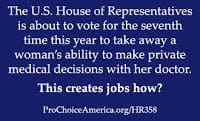
And I am, frankly, getting pretty tired of Chicken Little. I have what I am calling “donor fatigue,” and I worry that it has much bigger implications than we might think.
Two days ago, the US House of Representatives passed an ban on abortions nationwide after 20 weeks of pregnancy. While the measure didn’t pass with flying colors (228-196), and while it afforded very minor exceptions, it had seismic ripple effects that resulted in a cascade of frantic emails begging me to donate money to every pro-choice organization I’ve ever (and some I’ve never) heard of.
Enough!
Starting with the last Presidential election, I have been inundated with communications from the Democratic National Committee, Emily’s List, Planned Parenthood, NARAL, etc., etc. They all have one thing in common: FEAR-MONGERING. I am sick of it. These emails tout our loss of freedoms, an ever-restrictive, woman-hating opposition coming to power, and aim to drain the color from my face and set my heart to pounding. Other organizations such as Women’s Rights News post fantastical, sensational headlines on their Facebook pages designed to incite anger and raise my blood pressure. Many of these posts are downright man-bashing, stereotypical nastiness that embody everything these organizations hate about the way women are treated and I am left wondering where our momentum has taken us.
The fact is, we live in a pretty damn good time. While I most definitely do not agree with President Obama on every point, he has proven to be supportive of women’s rights for the most part (good thing he backed down on the Plan B availability to all women and girls) and had the most recent abortion ban passed in the Senate (which is a big What-if, because it seems highly unlikely), he would most definitely have vetoed the bill. Women and girls are making strides in elected office, education, and our fight for equality in the United States and around the world. We are by no means enjoying absolute equality and justice, but our voices are being heard more than they ever have, thanks in major part to organizations like Moms Rising and Miss Representation who direct their efforts toward educating others and amplifying the voices and stories of individual women and girls who are suffering injustices due to the way our system is designed. I am not constantly flooded with pleas to DONATE NOW by either of these groups and yet they seem to be effective in getting their message across.
I worry that groups like NARAL and Planned Parenthood and Emily’s List risk nickel-and-diming (and annoying) their constituent base by making weekly requests for money every single time a Republican lawmaker (or group of them) does something stupid. The truth is, these occurrences are all too frequent and we need to be able to distinguish between the times when a response is required and the times when these politicians are better left to twist in the wind. Simply reiterating that House Republicans would rather spend their energy voting on legislation that is entirely useless (repealing Obamacare, restricting abortion) than addressing the fundamental challenges most Americans face right now is probably more powerful a message than asking for money. In these cases, I am less and less sure of where my donation dollars are actually going and I am more and more likely to hit “delete” when I see any email from the offending organizations because I can’t stand one more screeching cry that “The sky is falling!” By the time it actually is, I won’t have any money left to give.








